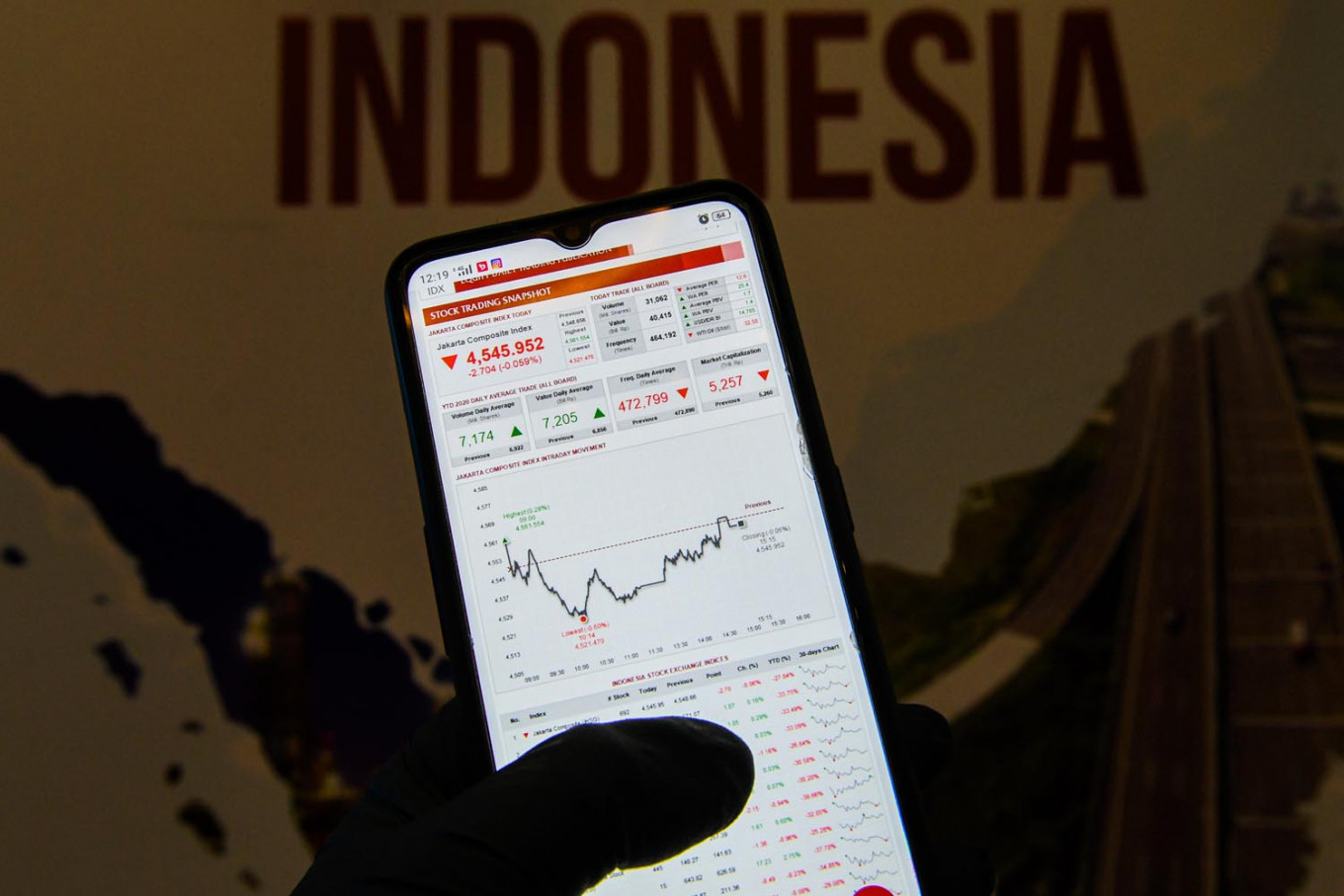Popular Reads
Top Results
Can't find what you're looking for?
View all search resultsPopular Reads
Top Results
Can't find what you're looking for?
View all search resultsNo equity bubble in Indonesia, for now: Analysts
Amid concern about equity bubbles about to pop in Europe and the United States, Indonesia’s stock market has barely appreciated this year as the country lags behind in its economic recovery.
Change text size
Gift Premium Articles
to Anyone
A
nalysts consider Indonesia relatively safe from an equity bubble, bucking a trend seen in western economies, as the country lags behind in its economic recovery.
The Indonesia Composite index, the main gauge of the Indonesia Stock Exchange (IDX), closed at 6,090.93 points on Wednesday, up only 1.8 percent from where it began the year and down 3.3 percent from the price seen at the end of 2019, before the pandemic began to make worldwide headlines.
By contrast, the main indices representing the United States stock market, the Nasdaq Composite, the S&P 500 and the Dow Jones, have gained between 16.5 and 27 percent so far this year, and all have far surpassed their pre-pandemic levels. Leading the pack, the tech index Nasdaq was trading on Wednesday at a whopping 70.6 percent above its 2019 close.
The pan-European STOXX 600 index has gained 17.5 percent this year and closed on Wednesday 13.7 percent above the pre-pandemic level, while Germany's DAX also made the effect of the virus all but forgotten, trading up just shy of 20 percent from the pre-pandemic level.
All this stands in stark contrast to the decline in prices seen over the pandemic period in Indonesian stocks.
“At this rate, [Indonesia] is still far from a [capital market] bubble risk. Instead, some of our stocks are undervalued,” Central Capital Futures analyst Wahyu Tri Laksono told The Jakarta Post on Tuesday.
Read also: Another dot-com bubble?
According to the Investopedia website, bubbles happen when there is a rapid escalation of market value exceeding an asset’s inherent value. At some time, bubbles may burst and cause a large market correction.
Signs of bubbles were very apparent in western stock markets, Wahyu said, adding that following their rapid growth over the past few months, some stocks no longer reflected fundamentals, making overvaluation inevitable.
The cause was no other than the large influx of stimulus funds poured into the market during the pandemic, according to Wahyu, as central banks in western countries went on an asset-buying spree.
Many investors were more afraid of missing out than losing money, he added.
Market participants were confident that central banks around the world would do whatever it took to prevent bubbles from bursting, even at the cost of ever more stimulus funding, Wahyu opined.
Indonesia had nothing of the sort, he said. Despite the loose monetary policy maintained by Bank Indonesia, investors had chosen to put much of their money into western capital markets.
“Stimulus [in western countries] is more attractive. In Indonesia, meanwhile, it's much more limited. So, it's only natural that investment will go there instead,” Wahyu explained.
Read also: Stocks set new records as August ends in buoyant mood
Concurring with Wahyu, Anugerah Mega Investama director Hans Kwee told the Post on Wednesday that the risk of an equity bubble frequently revolved around tech companies, as investors had grown an appetite for such stocks of late.
In Indonesia, few big tech companies had listed on the bourse. Some, he said, had their own “background stories” that could justify their valuation based on future prospects.
Thus, the risk of a bubble was less worrisome, he said. “There is potential for a bubble in the technology sector, but it won't be systemic.”
[chart]
David Sumual, chief economist at the country’s largest private lender, Bank Central Asia (BCA), opined that Indonesia’s capital market would remain stagnant for quite a while, which could limit how far Indonesian stocks could go.
So far, he had yet to see any signs of foreign investors making a return to Indonesia's stock market. Without their arrival, he said, it was hard to see how the domestic stock market could return to the pre-pandemic level soon.
Furthermore, prolonged mobility restrictions imposed to rein in the pandemic dampened expectations for Indonesia’s economic recovery. Meanwhile, the US Federal Reserve’s tapering plan is expected to weigh on commodity prices, which have been on the rise since last year.
“Foreign investors have yet to enter Indonesia. I mean, in a big way. Therefore, we will likely remain stagnant,” David told the Post on Tuesday.










